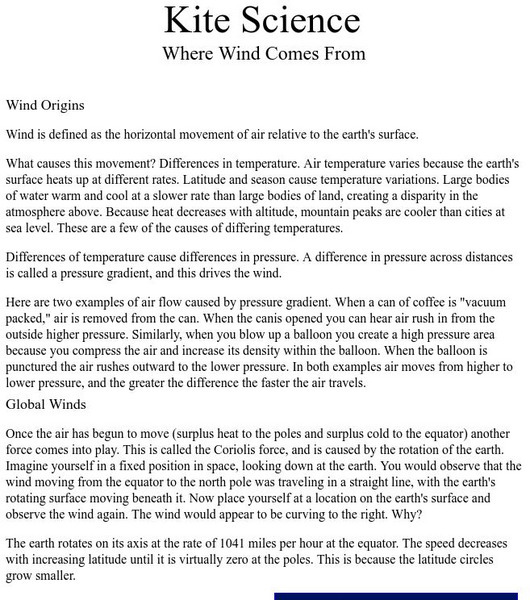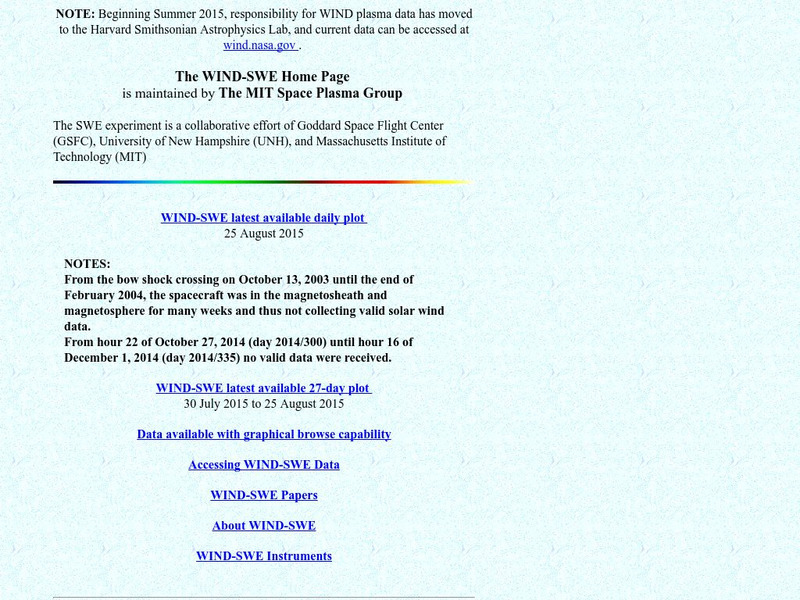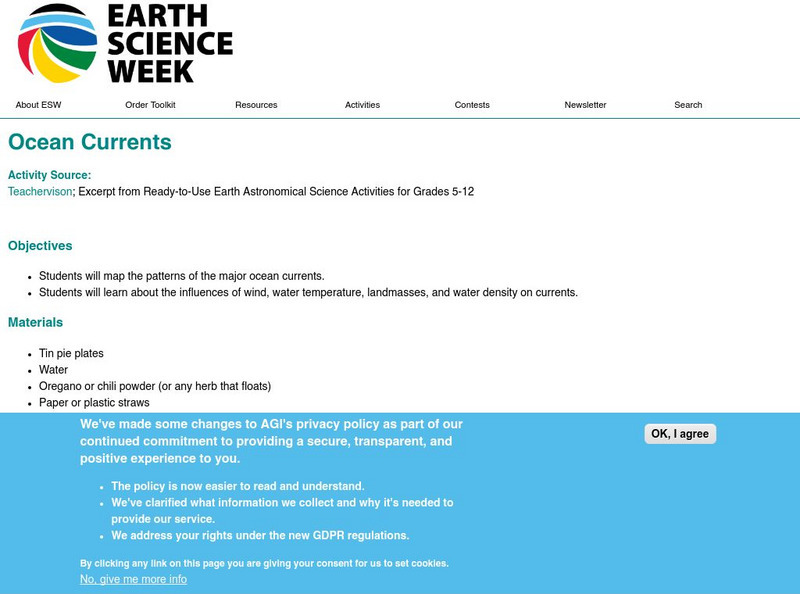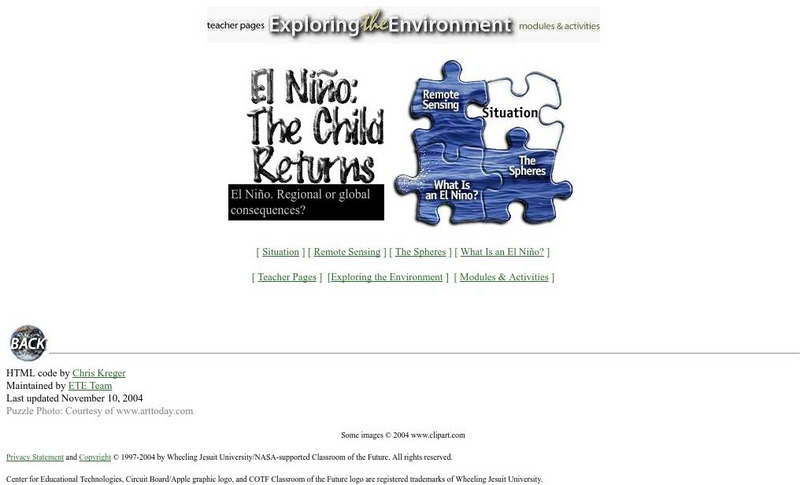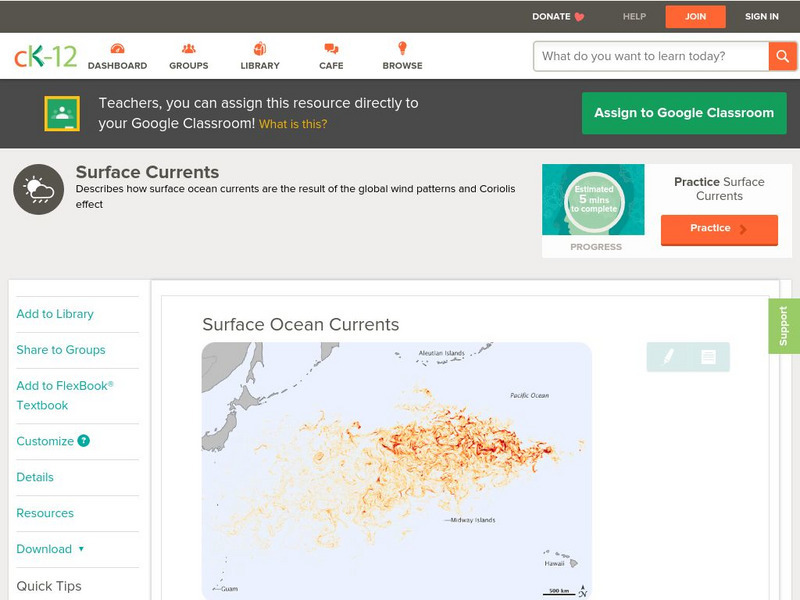Hi, what do you want to do?
NASA
Nasa: Cosmicopia: Solar Wind
Resource includes a brief description of solar wind, a solar wind model, a list of current articles concerning solar wind events, and "Solar Wind Activities," which include links to related lessons.
Other
Kites as Education: Wind Origins
This "kite science" site offers information on wind and the atmospheric conditions that cause it. From "Principles of Aeronautics."
CK-12 Foundation
Ck 12: Earth Science: Local Winds
[Free Registration/Login may be required to access all resource tools.] Descriptions of various types of local wind patterns.
Weather Wiz Kids
Weather Wiz Kids: Wind
Wind is air in motion. It is produced by the uneven heating of the earth's surface by the sun. Since the earth's surface is made of various land and water formations, it absorbs the sun's radiation unevenly. Two factors are necessary to...
Massachusetts Institute of Technology
Mit: The Wind Swe Home Page
This is a technical site from MIT. It provides data and information from satellites which observe solar winds. Provide 3-D models of the heliosphere and uptodate plots of solar wind data.
Curated OER
Global Wind Pattern on the Earth Without an Ocean, Axiz Tilt, and Rotation.
Global wind pattern on the earth without an ocean, axiz tilt, and rotation.
Weather Wiz Kids
Weather Wiz Kids: Wind
What is wind? How is it caused? This site offers simple answers to many common questions about wind as well as a chart of the Beaufort scale, which "is an empirical measure for the intensity of the weather based mainly on wind power."
NOAA
Noaa: Weather Systems and Patterns
Imagine our weather if Earth were completely motionless, had a flat dry landscape and an un-tilted axis. This, of course, is not the case; if it were, the weather would be much different. The local weather that impacts our daily lives...
The History Cat
The History Cat: Geography Phenomenon: Hurricanes
Describes how ocean currents affect climates around the world and the impact of the Gulf Stream, which can cause hurricanes to form. The role of wind patterns in the Caribbean is also discussed.
NASA
Nasa: El Nino
A concise explanation of El Nino. Discusses global wind patterns and ocean temperatures. Offers interactive weather-related learning activities.
PBS
Pbs Learning Media: Water Vapor Circulation on Earth
This simulation from the National Center for Atmospheric Research portrays annual patterns in water vapor and precipitation across the globe, illustrating general circulation patterns as well as seasonal and regional variation. [4:52]
Idaho State University
Global Wind Systems [Pdf]
A great description of the global scale circulation and heat energy. Discusses a single-cell model, a three-cell model, jet streams and more.
Other
The Virtual Sun: Between the Sun & Earth
The Virtual Sun by Michiel Berger provides a very brief overview of solar wind.
TeachEngineering
Teach Engineering: Build an Anemometer
Students create their own anemometers which are instruments for measuring wind speed. They see how an anemometer measures wind speed by taking measurements at various school locations. They also learn about different types of...
American Geosciences Institute
American Geosciences Institute: Earth Science Week: Ocean Currents
Students map the patterns of the major ocean currents, and learn about the influences of wind, water temperature, landmasses, and water density on currents.
University of Calgary
European Voyages of Exploration: 15th & 16th Centuries
This award-winning website from the University of Calgary's History Department is both impressive and extensive. It focuses on Portuguese and Spanish expeditions of the 15th and 16th centuries (the sitemap provides a good outline of...
Other
Art Gallery of Nova Scotia: The Inside Current
This is a lesson plan for Grade 8 that focuses on ocean currents and wind patterns. Part of it looks at the lessons learned from studying the flow of the rubber ducks accidentally dumped into the north Pacific Ocean in 1992.
Other
Texas Council on Economic Education: Building an Economy: Texas Experience [Pdf]
A 14-lesson, 169-page unit on the economic history of Texas. Lessons cover the free enterprise system, the economic patterns and motivations of Native Americans and various immigrant groups, the impact of the closing of the frontier, the...
Other
Digital Library for Earth System Education: Teaching Box: Essentials of Weather
A suite of lessons focusing on the basic elements of climate and weather. Inquiry-based exploration of extreme weather events and the factors of weather including clouds, wind, air pressure, temperature, and the water cycle.
Center for Educational Technologies
Exploring the Environment El Nino: The Child Returns
Use remote sensing data and background information to look at regional and global consequences of El Nino. Try working with the 'situation' to test your understanding.
South Carolina Educational Television
Know It All: Atmosphere | Nasa Online
The Earth is surrounded by a thin envelope of gases called the atmosphere. More than 500 active volcanoes erupt around the world affecting the Earth's atmosphere and global climate.
University of Illinois
University of Illinois Extension: Ww2010: Radar Meteorology
This site from the University of Illinois explains basic principles of weather radar, its development, and application to weather forcasting. Includes section on how wind patterns are shown using doppler radar.
CK-12 Foundation
Ck 12: Earth Science: Surface Ocean Currents
[Free Registration/Login may be required to access all resource tools.] Describes how wind patterns and other factors cause ocean surface currents.
Other popular searches
- Global Wind Patterns
- Earths Wind Patterns
- Wind Patterns and Weather
- Pressure Wind Patterns
- Prevailing Wind Patterns
- Global Wind Patterns Notes
- Wind Patterns Ocean
- World Wind Patterns






